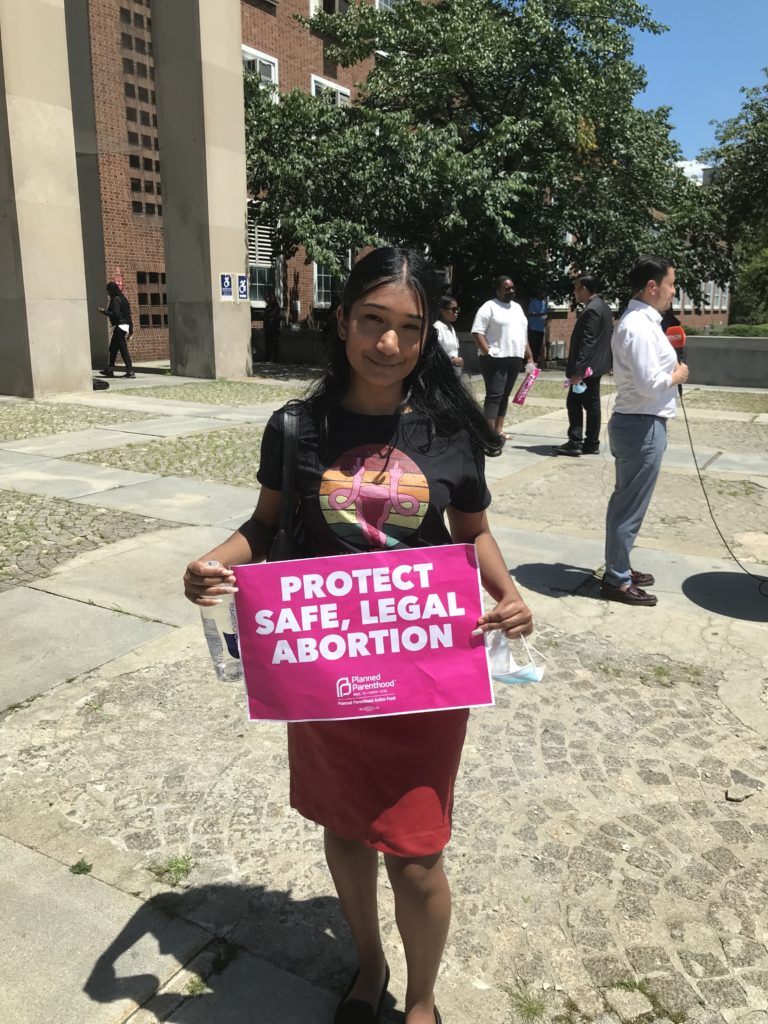Borough President joined by activists, elected officials to protest Supreme Court abortion decision
By Juan Arturo Trillo
news@queensledger.com
In response to the U.S. Supreme Court’s reversal of the “Roe v. Wade” landmark decision, the Queens Borough President’s Office organized an abortion rally on Tuesday, June 28—the same day as New York’s primary elections.
Deputy Borough President Ebony Young kicked off the event, saying that “Queens will not stay silent.”
Young explained some of the implications that the Supreme Court abortion ruling may have, specifically on minority women. About 70 percent of black women are breadwinners for their families, Young said. A forced birth may necessitate that they give up on their careers and income, she added.
Young also stated that when performing unsafe abortions, women of color died at 12 times the rate of white woman before the original “Roe v. Wade” ruling.
“Why are we going backwards?” Young asked, adding that young black women have less rights than she did during her youth.
Young was joined by various leaders in the pro-choice and reproductive justice movements.
Anjali Seegobin, member of South Queen’s Women’s March, called the Roe decision “alarming and unethical.”
Seegobin said that the black women, low-income women, and trans-men who led the pro-choice and reproductive justice movements will be the ones to face the harshest consequences of the Supreme Court’s new ruling.
According to Seegobin, 80 percent of Americans believe abortion should be legalized.
Maryam Mohammed-Miller, director of Government Relations at Planned Parenthood of Greater New York, affirmed that “abortion is healthcare, and it is still your legal right here in New York state.”
“New York is proud to be a safe harbor for those who are forced to travel hundreds or even thousands of miles to seek abortion services,” Mohammed-Miller said.
Mohammed-Miller added, “one should not have to travel from Jackson, Mississippi to Jackson Heights, Queens to access abortion care.”
Mohammed-Miller said that Planned Parenthood of Greater New York’s abortion appointment availability has increased by 20 percent for all 23 health centers in response to the Supreme Court ruling.
Mary Lou Greenberg of Choice’s Women’s Medical Center, who was present at the 1989 pro-choice demonstration at St. Patrick’s Cathedral, said that women from other states are already making abortion appointments at Choice’s.
Greenberg wore a green scarf, explaining that it was the same color as bandanas worn by women in South and Central American pro-choice demonstrations. Greenberg wore the scarf to stand in solidarity with these women and recognize their discipline and dedication.
Cecilia Venosta, president of the Center for Women of New York, added that her father said to “look forward” when immigrating to the United States. Since then, Argentina has legalized abortion.
Venosta called the Supreme Court ruling “another manifestation of the same regressive forces that always appear when people demand equal protection under the law.”
The rally occurred on the same day as New York State primary elections.
Emily Paez, director of Government Affairs and Civic Engagement at Hispanic Federation encouraged people to get out and vote. She asserted that the influence of elected officials is most vivid in situations like these.
Various elected officials were present at the rally, including Assemblywoman Jessica Gonzáles-Rojas and Assemblyman Andrew Hevesi.
Gonzáles-Rojas claimed that “in 2022, corporations and guns have more rights than women and pregnant people.”
Hevesi added, “as a straight white male, nobody ever tells me what to do with my body. But they sure just told my daughter, and they sure just told my wife.”
They were joined by Councilwoman Lynn Schulman, whose great-grandmother passed away attempting to give herself an abortion.
Borough President Donovan Richards acknowledged stories like Schulman’s great-grandmother, saying that “elections have life and death consequences, and let’s be clear—there are women who are going to die because of this decision.”
“If we start paying attention to local races across the country, we can prevent laws being passed that force teenagers to carry their rapist’s baby to term,” Richards added.
He listed ways people can get involved in the pro-choice and reproductive justice movements. These include volunteering at abortion clinics or advocacy groups and donating money to abortion programs in conservative states or other funds.
Richards made it clear that despite abortion being a women’s issue, men must also speak up.
“We all have a choice now,” Richards said. “Do we hang our heads and give up, or do we do everything in our power to protect people seeking abortions and expand access to care even in states with trigger laws?”



